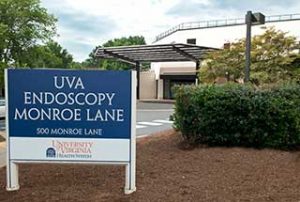Have you been keeping up with the Division of Gastroenterology and Hepatology‘s recent milestones? The division (“GI”) and its clinical arm, the UVA Digestive Health Center, has been expanding its clinical services and garnering awards for quality of care and community outreach. Here are some high points:
- December 2016: National Pancreas Foundation (NPF) designates UVA as an NPF Pancreatitis Center, in recognition of the high quality of its patient care in this area. The new center is led by GI’s Daniel Strand, MD.
- July 2017: UVA Endoscopy Monroe Lane opens
- The division’s new endoscopy facility on Monroe Lane, under medical director Bryan Sauer, MD, offers upper endoscopy and colonoscopy procedures, along with improved access to advanced treatments, in a new state-of-the-art facility with 23,000-square feet of space. The facility features five new procedure rooms and 20 new prep/recovery rooms.
- The new Motility Lab at the Monroe facility, directed by Jeanetta Frye, MD, has expanded capacity and equipment to facilitate advanced testing [see sidebar].
- August 2017: U.S. News & World Report recognizes UVA Digestive Health as one of four “high performing” specialties at the UVA Health System — placing it among the top 10 percent nationally in its specialty area.
- October 2017: Gastro-Hep welcomes James M. Scheiman, MD, as its new division chief. Dr. Scheiman joined UVA from the University of Michigan, where he served with distinction on the Division of Gastroenterology faculty for more than 25 years, in a variety of leadership positions. Department of Medicine chair Mitch Rosner called Dr. Scheiman an “accomplished clinician, clinical investigator and educator,” and said he would “help lead the division on its continued path to excellence in all of our mission areas.”
- October 2017: GI Wins 2017 “SCOPY” Award from American College of Gastroenterology. The division received the award in the category of “Best Coordinated Community Health Intervention” for its program “Reaching Every Corner of Virginia with Coordinated Public Health Effort.”


Q & A with Dr. Jeanetta Frye
Q: You were recently appointed medical director for the GI Motility Lab. What does that involve?
GI’s Motility Lab, which is housed in the new Monroe Endoscopy facility, performs a full spectrum of diagnostic tests to assess GI motility disorders. As director, I work with our nursing staff and my colleagues, in particular Dr. James Mann, to ensure that the lab is incorporating the latest testing and equipment for motility-related disorders. In some, testing standards are evolving quickly.
Q: What kinds of tests does the Motility Lab perform?
Patients come to us with a variety of complaints: constipation, diarrhea, bloating/gas, reflux, and dysphagia, among others. Specialized tests — including esophageal manometry, which measures muscle function in the esophagus, and breath tests for evaluating conditions like small intestine bacterial overgrowth and lactose, fructose, or fructans malabsorption — help gastroenterologists pinpoint the specific causes of gastrointestinal disorders, leading to more targeted treatment.
Q: Tell us about your recent training experiences.
I went to Vanderbilt University, where I did my M.D., for further training with Michael Vaezi, MD, PhD, an esophagologist. I also visited the Medical College of Georgia’s Augusta University, and I will be making a return visit. I learned about cutting-edge procedures for anorectal manometry and for evaluating patients with constipation related to pelvic floor disorders.
Filed Under: News and Notes
